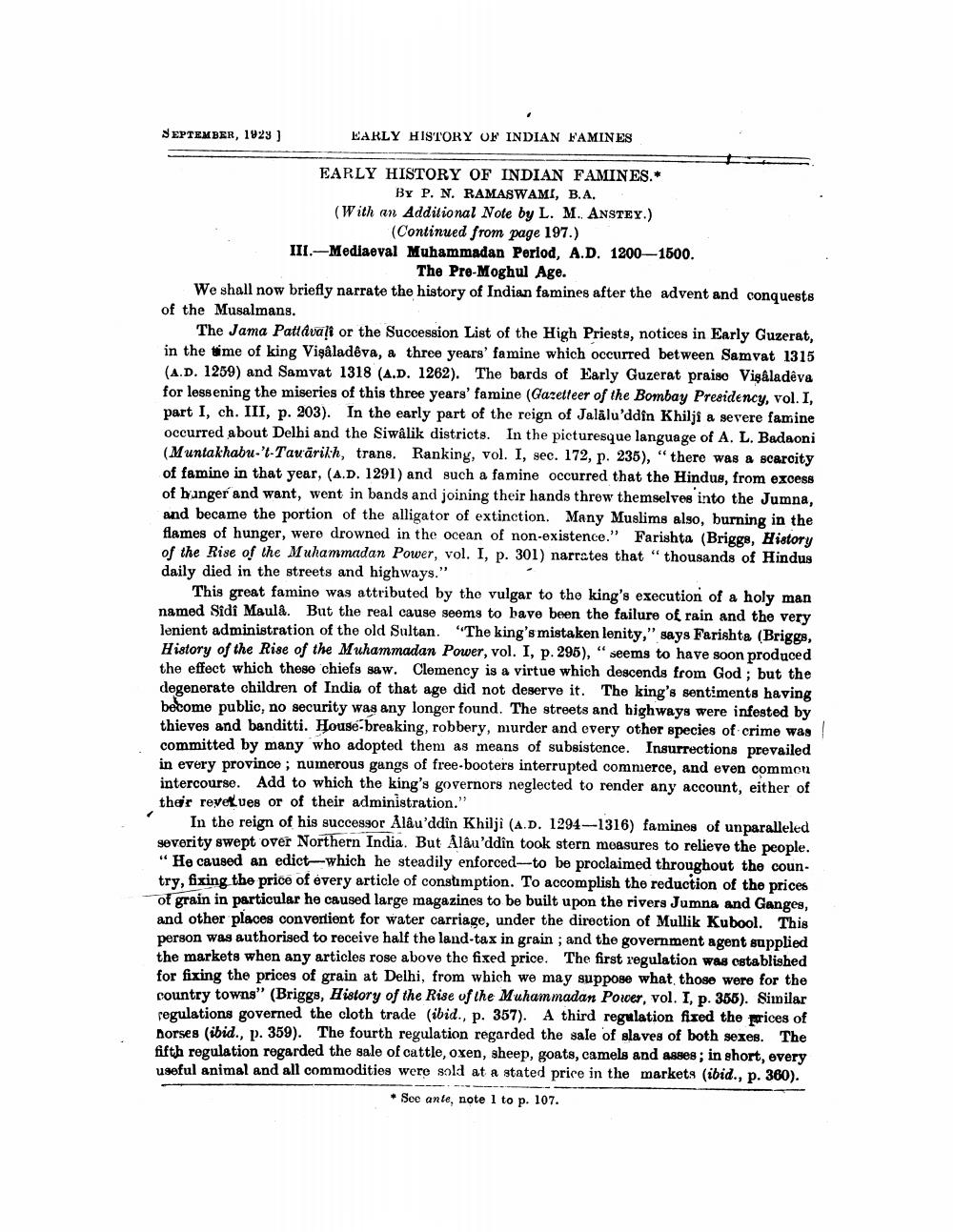________________
SEPTEMBER, 1923)
EARLY HISTORY OF INDIAN FAMINES
EARLY HISTORY OF INDIAN FAMINES.
By P. N. RAMASWAMI, B.A. (With an Additional Note by L. M. ANSTEY.)
(Continued from page 197.) III.-Mediaeval Muhammadan Period, A.D. 1200-1500.
The Pre-Moghul Age. We shall now briefly narrate the history of Indian famines after the advent and conquests of the Musalmans.
The Jama Pattavalt or the Succession List of the High Priests, notices in Early Guzerat, in the fime of king Vigaladêva, a three years' famine which occurred between Samvat 1315 (A.D. 1259) and Samvat 1318 (A.D. 1262). The bards of Early Guzerat praise Vişâladeva for lessening the miseries of this three years' famine (Gazetteer of the Bombay Presidency, vol. I, part I, ch. III, p. 203). In the early part of the reign of Jalaluddin Khilji a severe famine occurred about Delhi and the Siwâlik districts. In the picturesque language of A. L. Badaoni (Muntakhabu-'t-Tavārikh, trans. Ranking, vol. I, sec. 172, p. 235), "there was a scarcity of famine in that year, (A.D. 1291) and such a famine occurred that the Hindus, from excess of banger and want, went in bands and joining their hands threw themselves into the Jumna, and became the portion of the alligator of extinction. Many Muslims also, burning in the flames of hunger, were drowned in the ocean of non-existence." Farishta (Briggs, History of the Rise of the Muhammadan Power, vol. I, p. 301) narrates that "thousands of Hindus daily died in the streets and highways."
This great famine was attributed by the vulgar to the king's execution of a holy man named Sidi Maula. But the real cause seems to have been the failure of rain and the very lenient administration of the old Sultan. "The king's mistaken lenity," says Farishta (Briggs, History of the Rise of the Muhammadan Power, vol. I, p. 296), “ seems to have soon produced the effect which these chiefs saw. Clemency is a virtue which descends from God; but the degenerate children of India of that age did not deserve it. The king's sentiments having become public, no security was any longer found. The streets and highways were infested by thieves and banditti. House-breaking, robbery, murder and every other species of crime was committed by many who adopted them as means of subsistence. Insurrections prevailed in every province; numerous gangs of free-booters interrupted commerce, and even commen intercourse. Add to which the king's governors neglected to render any account, either of ther repekues or of their administration."
In the reign of his successor Alâu'ddin Khilji (A.D. 1294--1316) famines of unparalleled severity swept over Northern India. But Alâu'ddîn took stern measures to relieve the people. "He caused an edict which he steadily enforced-to be proclaimed throughout the country, fixing the price of every article of consumption. To accomplish the reduction of the prices of grain in particular he caused large magazines to be built upon the rivers Jumna and Ganges, and other places convertient for water carriage, under the direction of Mullik Kubool. This person was authorised to receive half the land-tax in grain ; and the government agent supplied the markets when any articles rose above the fixed price. The first regulation was established for fixing the prices of grain at Delhi, from which we may suppose what those were for the country towns" (Briggs, History of the Rise of the Muhammadan Power, vol. I, p. 356). Similar regulations governed the cloth trade (ibid., p. 357). A third regulation fixed the prices of horses (ibid., p. 359). The fourth regulation regarded the sale of slaves of both sexes. The fifth regulation regarded the sale of cattle, oxen, sheep, goats, camels and asses; in short, every useful animal and all commodities were sold at a stated price in the markets (ibid., p. 360).
• See ante, note 1 to p. 107.




